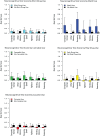Neurocognitive functioning of individuals with schizophrenia: using and not using drugs
- PMID: 23884348
- PMCID: PMC4059433
- DOI: 10.1093/schbul/sbt099
Neurocognitive functioning of individuals with schizophrenia: using and not using drugs
Abstract
Objectives: Research on neurocognition in schizophrenia, using modest samples and self-rated assessments, reports drug use contributes to improved rather than impaired cognitive function. We have sought to replicate these findings in a large sample of patients that had their drug-use status confirmed by laboratory assays and evaluated the potential differences in cognitive function between patients with positive and negative results.
Methods: Nine hundred and seventy four schizophrenia patients completed neuropsychological and laboratory tests at screening/baseline of the Clinical Antipsychotic Trials of Intervention Effectiveness study. Radioimmunoassay (RIA) of hair tested for cannabis, cocaine and methamphetamine.
Results: Many patients screened positive for drug use (n = 262; 27%), and there were no differences between patients with positive and negative results in terms of cognitive function after adjusting for multiple inference testing, except patients with positive RIA for methamphetamine demonstrated increased processing speed (corrected, P = .024). Moderator models were employed to explore potential subgroup differences in this pattern of results. At low medication dosages, patients with positive RIA for cocaine demonstrated decreased processing speed compared with patients with negative RIA for cocaine (uncorrected, P = .008). And for any other drugs with low psychopathology, patients with positive RIA demonstrated decreased working memory compared with patients with negative RIA (uncorrected, P = .006).
Conclusions: No positive effects of cannabis on cognitive function were observed, and drug use was not associated with improved neurocognition across most of the subgroup characteristics explored in this sample of schizophrenia patients.
Keywords: cannabis; cognitive function; comorbidity; illicit drugs; psychosis; schizophrenia.
© The Author 2013. Published by Oxford University Press on behalf of the Maryland Psychiatric Research Center. All rights reserved. For permissions, please email: journals.permissions@oup.com.
Figures
References
-
- Reimherr F, Swartz M, Olsen J. Substance use in persons with schizophrenia: incidence, baseline correlates, and effects on outcome. In: Stroup ST, Liberman JA, eds. Antipsychotic Trials in Schizophrenia. New York, NY: Cambridge University Press; 2010: 189––206
-
- Keefe RS. Neurocognition. In: Stroup ST, Liberman JA, eds. Antipsychotic Trials in Schizophrenia. New York, NY: Cambridge University Press; 2010: 189––206
-
- Regier DA, Farmer ME, Rae DS, et al. Comorbidity of mental disorders with alcohol and other drug abuse. Results from the Epidemiologic Catchment Area (ECA) Study. JAMA. 1990;264:2511–2518 - PubMed
Publication types
MeSH terms
Substances
Grants and funding
LinkOut - more resources
Full Text Sources
Other Literature Sources
Medical


